Key takeaways:
- Understanding trypanophobia reveals that fear often arises from past traumatic experiences and feelings of helplessness.
- Healthcare education provides vital knowledge that helps reduce anxiety and empowers patients to engage with healthcare providers.
- Effective anxiety management strategies include deep breathing, visualization, and seeking support from trusted individuals.
- Overcoming the fear of needles leads to increased confidence in healthcare, allowing individuals to take proactive steps for their well-being.
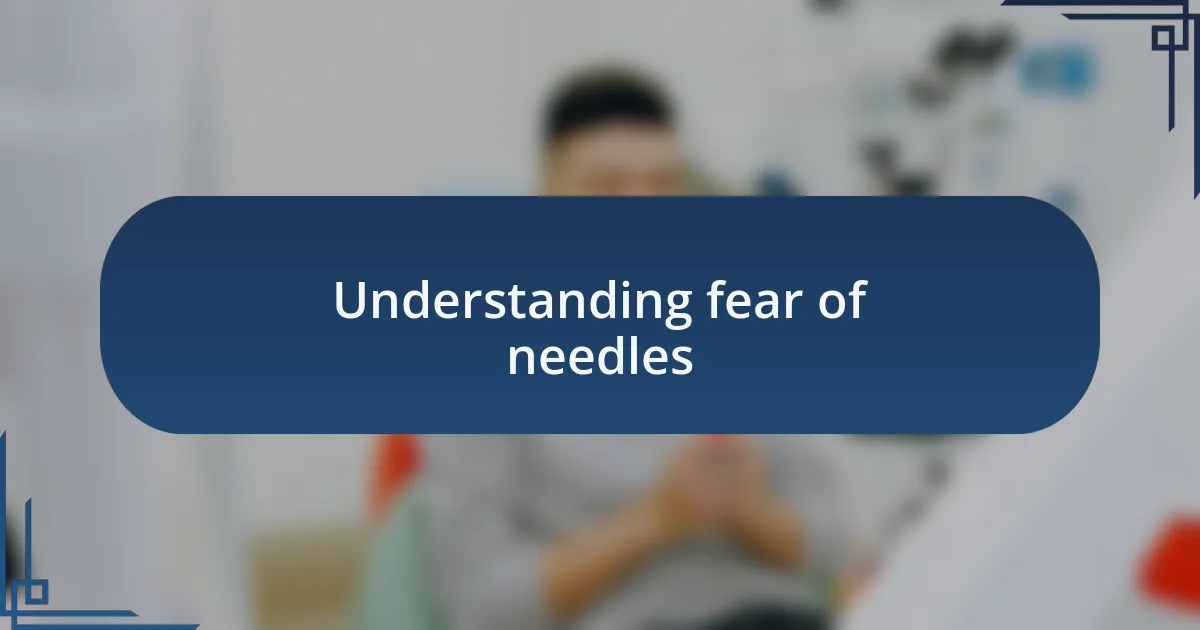
Understanding fear of needles
The fear of needles, known as trypanophobia, is more common than many realize. I remember my early experiences with shots; my heart would race, and my palms would sweat as I just anticipated the prick. Reflecting on it, I often wonder—what is it about that small, sharp object that sends so many of us into a tizzy?
In my journey to understand this fear, I discovered that it often stems from a traumatic experience, whether it’s a painful shot in childhood or simply the anxiety of the unknown. I still recall the first time I had to get a blood draw. I had built up such dread that when I finally sat in the chair, I wasn’t just scared—I felt utterly out of control. It was in those moments of helplessness that I realized the power of our emotions over seemingly simple situations.
In speaking to others about their fears, I found a common thread: it’s not just the needles themselves, but the feelings of helplessness and vulnerability associated with them. Have you experienced that same sensation? Maybe it’s the sterile environment of a clinic or the stories we’ve heard about adverse reactions that create an emotional backdrop, amplifying our anxiety. Understanding these triggers—and how they affect us—is the first step in overcoming them.

Importance of healthcare education
Healthcare education plays a crucial role in demystifying medical procedures and alleviating fears like trypanophobia. When I first learned about the anatomy of human veins and how a needle interacts with them, it surprisingly helped calm my anxiety. Knowledge provided a sense of control; instead of viewing needles as threats, I started to see them as tools with a purpose.
Moreover, education empowers patients to ask questions during consultations. I vividly remember the first time I bravely asked a nurse about the specific injection I was about to receive. Her warm and informative response significantly eased my nerves. How often do we let fear silence our curiosity? Embracing education allows us to engage openly with healthcare professionals, fostering a supportive atmosphere where our worries can be addressed.
Finally, understanding healthcare practices cultivates confidence and trust in the healthcare system. When faced with a procedure, I now draw on the information I’ve gathered over time. Whether through workshops, blogs, or discussions, this knowledge ignites a sense of preparedness. Isn’t it comforting to think that proactive learning can be a powerful antidote to fear?
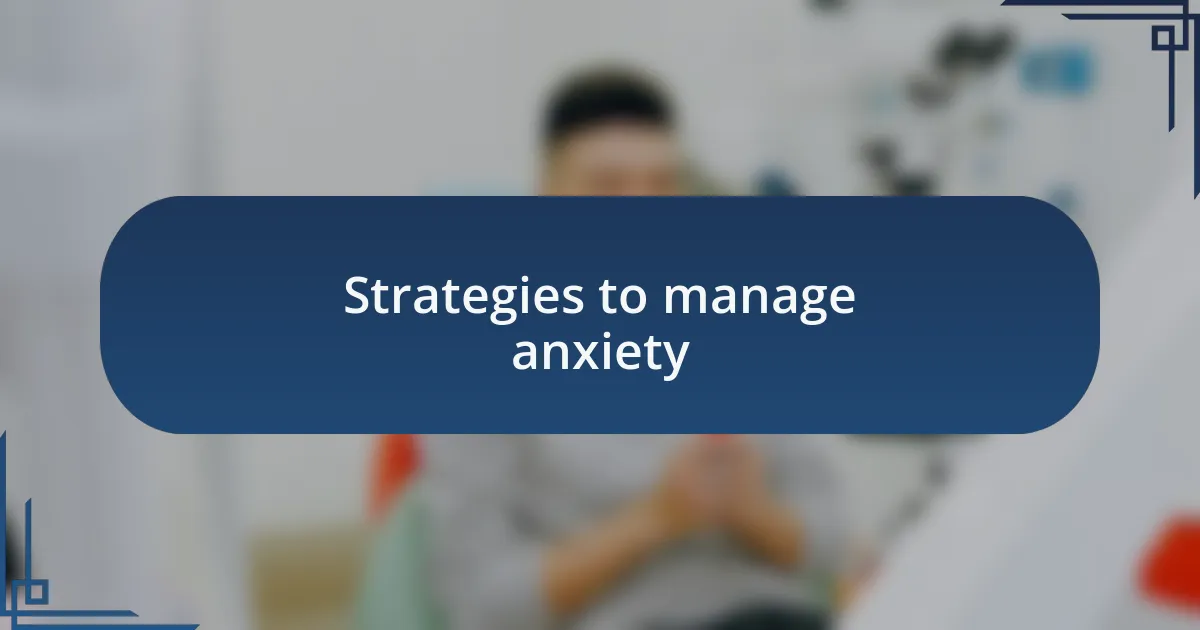
Strategies to manage anxiety
When managing anxiety, I found that deep breathing techniques are incredibly effective. During a recent visit for a blood test, I remembered to take slow, deliberate breaths. Focusing on my inhalation and exhalation created a calming rhythm, which helped ground me in the moment, reducing the overwhelming feelings I often experienced.
Another strategy that worked wonders for me was visualization. Before my appointment, I imagined myself in a peaceful setting, perhaps a sunlit beach. By picturing this serene environment, I was able to create a mental space that shifted my attention away from the needle and toward a more positive experience. Have you ever tried imagining a calm scene to escape anxiety? It’s fascinating how our minds can transform our emotions with a little creativity.
Lastly, involving a trusted friend or family member during the process has been invaluable. I recall holding my partner’s hand tightly during a procedure that made me anxious. Their support reminded me that I wasn’t alone, and their presence provided an extra layer of comfort. How empowering it is to share that burden with someone who understands! This simple act made a significant difference in my overall experience.
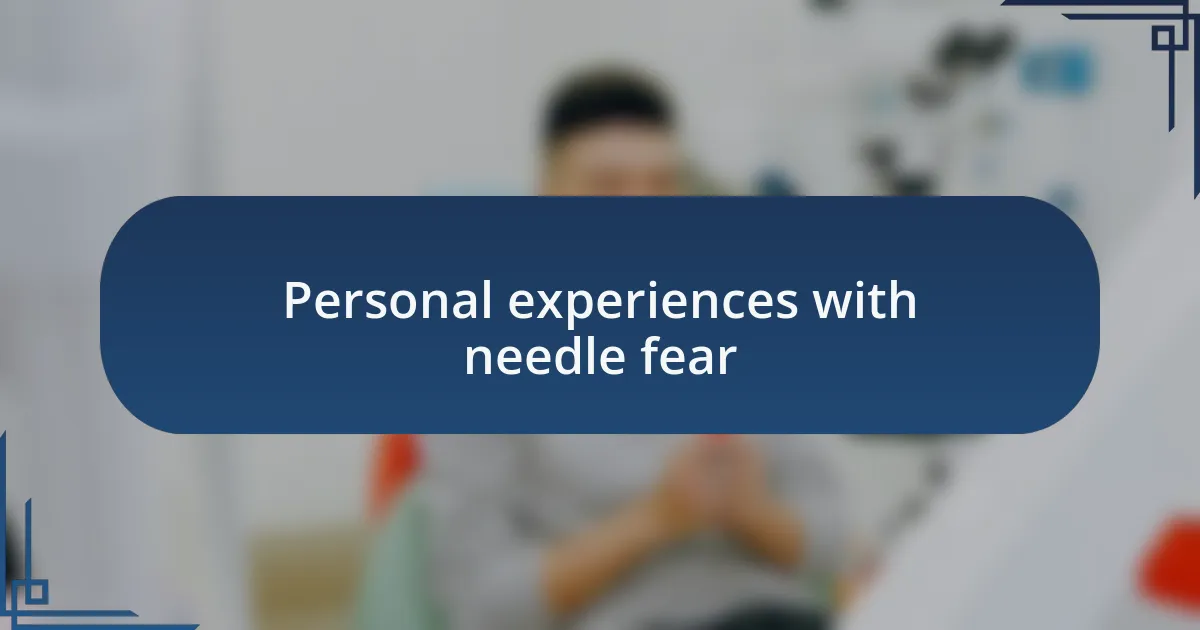
Personal experiences with needle fear
I vividly remember my first encounter with a needle—an experience that felt more like a mini horror film than a mundane doctor’s visit. As the nurse approached with that shiny syringe, my pulse raced, and I could practically hear my heart in my ears. It was as if time slowed down, and I remember thinking, “How can something so small evoke such fear?” That moment became a pivotal point where I realized I had to confront this fear head-on.
One particular instance stands out when I had to get a vaccination for a job. I walked into the clinic, rehearsing positive affirmations in my mind. However, when I saw the needle, my stomach dropped. I paused to assess my feelings, realizing that understanding my emotions helped me gain a sense of control. With each passing second, I told myself, “This will be over before I know it.” That shift in focus, from dread to resolution, made a profound impact on how I viewed needle encounters.
Processing my fear wasn’t solely about the act of getting pricked; it was about unpacking years of anxiety. I recall going to therapy, where I learned that my fear stemmed from a lack of trust in the process and uncertainty about the outcome. Reflecting on that helped me grow. Have you ever tried connecting the dots between your fear and its root cause? Understanding can be a powerful catalyst for change.
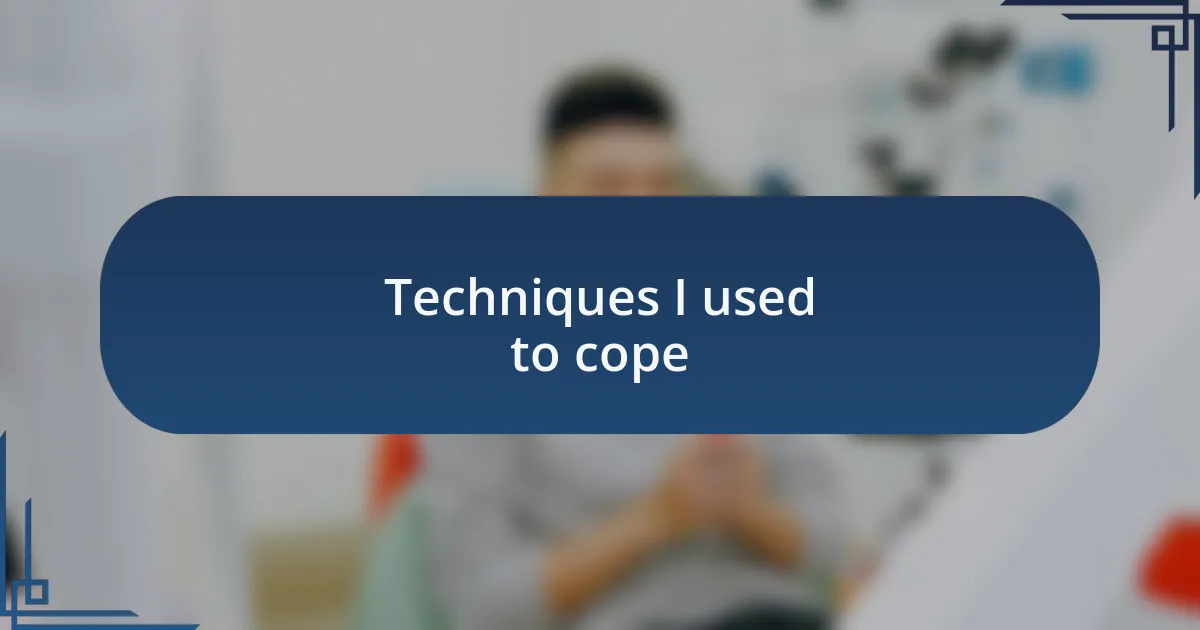
Techniques I used to cope
When it came time to face my fear of needles, one technique that helped me immensely was visualization. I started picturing serene scenes, like a calm beach or a peaceful forest, while the nurse prepared the syringe. Focusing on those happy images created a mental barrier against the anxiety creeping in. Have you ever noticed how your mind can escape to a better place?
Another strategy was bringing a trusted friend along for support. Having someone familiar by my side made the entire experience less daunting. It was comforting to share a few jokes and light-hearted stories right before the injection. Think about it: doesn’t having a little laughter help ease some of the tension in stressful situations?
Lastly, deep breathing became my go-to coping mechanism. Just before the needle approached, I would take slow, deliberate breaths—inhale for four counts, hold for four, and exhale for another four. This practice helped center my thoughts and calm my racing heart. Have you tried using your breath as a tool in difficult moments? It’s amazing how something so simple can create a sense of grounding when anxiety tries to take over.
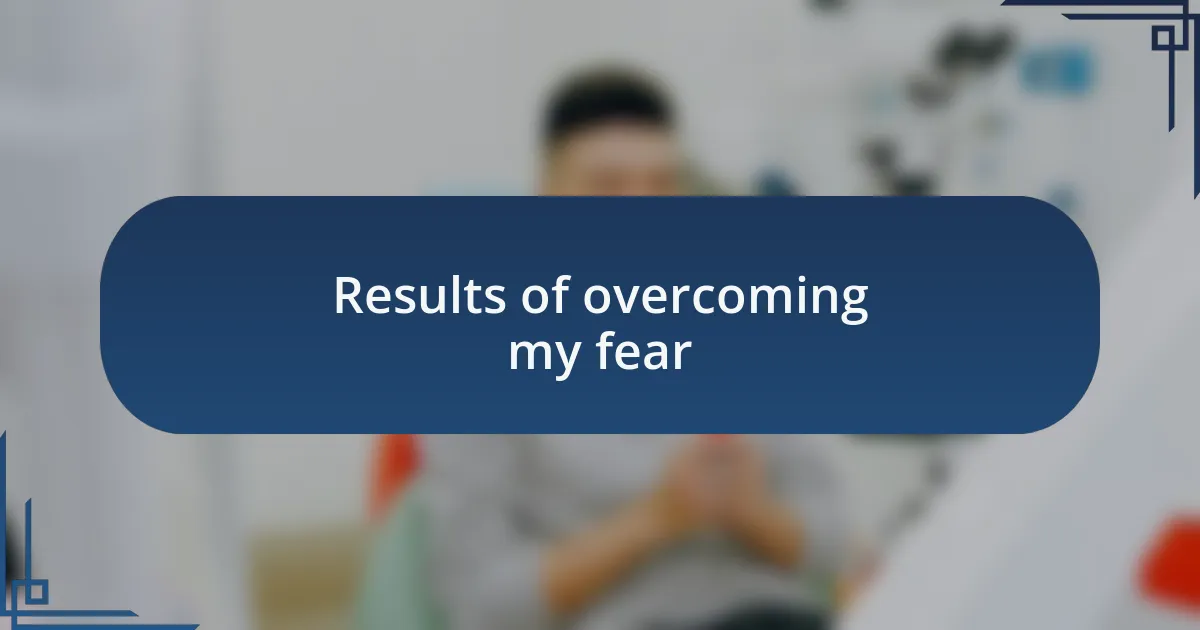
Results of overcoming my fear
Overcoming my fear of needles opened up new avenues in my healthcare journey. I remember finally being able to give blood for the first time after years of avoiding it. That small act felt like climbing a mountain, and I left the clinic with a mix of pride and relief. Have you ever felt that rush when you conquer something you thought was impossible?
Now, routine vaccinations and blood tests are no longer sources of dread for me but rather opportunities to take control of my health. I embraced the idea that these procedures are essential for my well-being. It’s empowering to know that I can engage in proactive healthcare without being held back by fear. Doesn’t it feel great when you can do something that benefits you?
Additionally, sharing this experience with others has been incredibly rewarding. Friends and family often reach out after hearing my story, and I can help support them in overcoming their own fears. This connection reinforces the idea that we’re not alone in our struggles; we can transform fear into shared strength. Have you experienced that sense of community when conquering fears together? It’s truly uplifting.